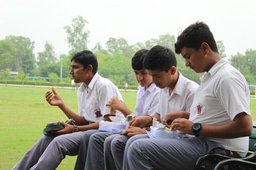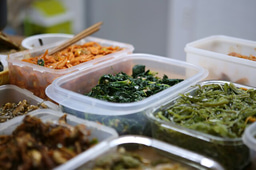Healthy vibes only, UNAM’s new food rules supporting adolescent´s well-being
Published in Sustainability and Agricultural & Food Science

In a decisive move towards promoting student health and well-being, the largest university in Mexico, the Universidad Nacional Autónoma de México (UNAM) has updated its guidelines for food concessionaires operating across its high school campuses—including the Escuela Nacional Preparatoria (ENP) and Colegio de Ciencias y Humanidades (CCH). These regulations, which are not just aspirational but mandatory as of September 1st, 2025, aim to radically reshape what students eat and how food services function.
Health-First Nutritional Standards at a glance
According to UNAM’s Guidelines for the preparation, distribution, and sale of prepared, processed, and bulk foods and beverages, as well as the promotion of healthy lifestyles in nutrition within the 14 high school campuses, the sale of the following is strictly prohibited:
- Pre-packaged products with front-of-package warning labels.
- Bulk products mainly composed of industrial ingredients with added fats, refined flours, sodium, or sugar.
- Homemade preparations containing excessive fats, refined flours, sodium, or sugar.
- Fruits and vegetables that are canned, sweetened, fried, pickled, in syrup, or with added salt or sugar.
Nutritional Standards promote fresh, regional, seasonal and home-made options and position plain water as the main source of hydration
UNAM’s Commission for the Operation of Concessions plans to supervise compliance which can trigger termination of the concession contract.
A Stronger Oversight Framework
On September 30, 2024, the Mexican Government published the National School Food Standards, setting nutritional criteria for the preparation, distribution, and sale of foods and beverages across the basic education. Pursuant to recent amendments to the General Law of Education and the new Healthy and Sustainable Law, the standards are now mandatory and enforceable; both statutes authorize sanctions for school principals who do not adhere to them. UNAM expressly incorporates this federal framework into its own lineaments.
Why does this matter so much?
In Mexico, adolescents’ consumption of ultra-procesed food is high. National data suggest that about 90% adolescents consume sugar-sweetened beverages, and they are the age group with the lowest fruit consumption. While the obesity rate is as high as 17%. In addition, the consumption of ultra-processed food has been associated with common health issues among adolescents, such as anxiety, depression, and poor sleep, alongside cardiovascular disease, Type 2 diabetes, obesity, and cancer.
The World Health Organization (WHO) indicates that: “If you want adolescents to be healthy, you have got to start where they spend most of their day—school.” This do not refer skipping soda once in a while—it refers to making the whole school food scene healthier: more fresh, tasty, and balanced meals, and less of the fried, sugary, or super salty ultra-processed food. That is in UNAM is fostering by banning ultra-processed food. UNAM’s new food rules are not just a local upgrade—they actually sync up with what the World Health Organization stated in its global plan to boost adolescents´ health, known as the AA-HA! (Accelerated Action for the Health of Adolescents). According to the AA-HA! guide, adolescence is the perfect moment to build habits that can last a lifetime.
Taking care of the planet, too
These standards are not just addressing adolescents' health; they can also shrink the planetary environmental footprint of campus food. Ultra-processed food are tightly entwined with single-use plastics and packaging, contributing to waste and pollution. As ultra-processed food is highly pollutant, the benefits of these guidelines may reduce waste and pollution in Mexico City.
The Road Ahead
Today, September 1st , 2025 campus food vendors need to overhaul their menus and operations. School authorities are expected to promote health and ensure compliance with the guidelines, guarantee hygiene and safety conditions in school food services, oversee concessions jointly with the Supervision Commission for Food and Beverage Concessions, and promote physical activity, sports, cultural, and artistic events to foster harmonious coexistence. All these efforts also require families' commitment to support healthy eating outside the school.
Follow the Topic
What are SDG Topics?
An introduction to Sustainable Development Goals (SDGs) Topics and their role in highlighting sustainable development research.
Continue reading announcement



Please sign in or register for FREE
If you are a registered user on Research Communities by Springer Nature, please sign in